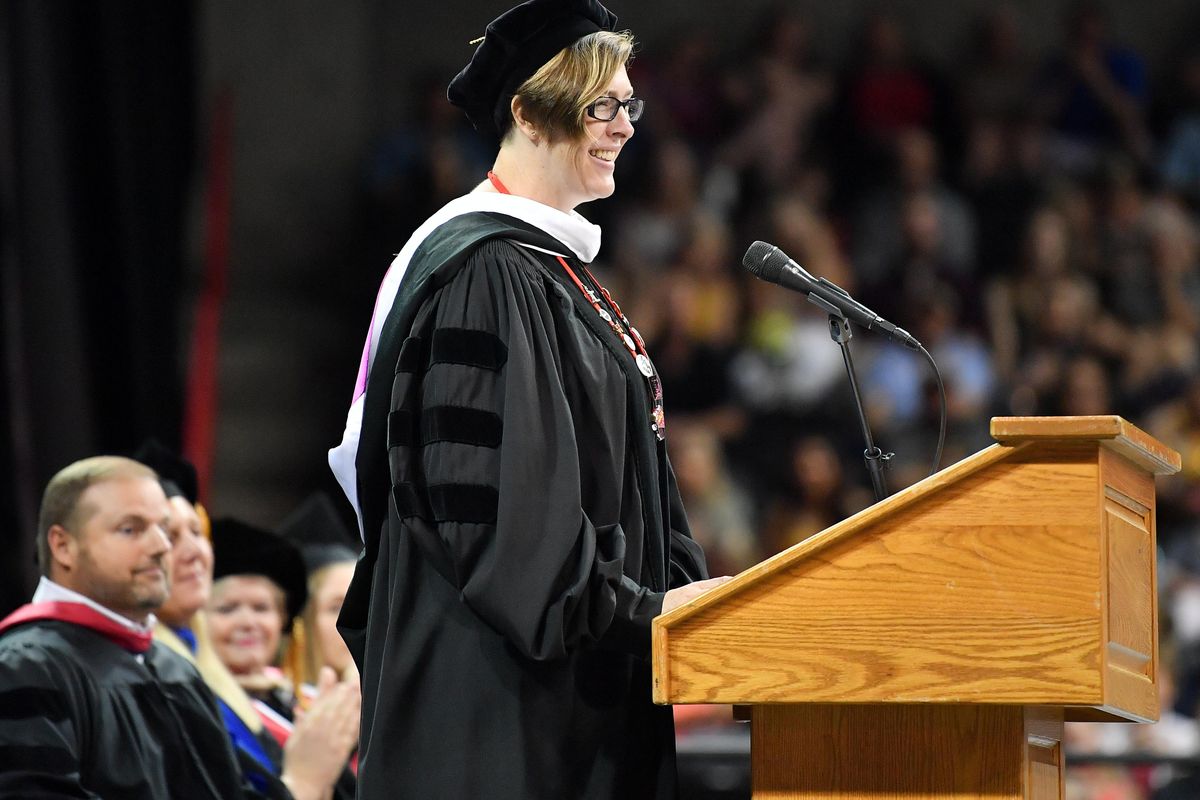A teacher’s odyssey: Mandy Manning looks back on her tenure as Teacher of the Year

It’s been quite a year for Mandy Manning – rewarding, exhausting and refreshing, even in the middle of a refugee camp in Serbia.
“But over there they call them reception centers,” Manning said with a wry smile. “Wouldn’t it be lovely if we called them that?”
She smiled at the thought of effecting that kind of change in her own country.
“I’ve definitely tried,” said Manning, who plans to return this fall to the Newcomer Center at Ferris High School, where she again expects to welcome recently arrived refugees and immigrant students – and give them hope.
Last year, Manning was named the 2018 National Teacher of the Year. Sudden fame also meant the opportunity to make a difference beyond Spokane.
“I don’t know how successful I’ve been, but it has been meaningful for many people,” Manning said last week during a break between trips.
“That’s all I can ask for,” said Manning, who in turn has been asked to do plenty during the past year.

“I was always a traveler, but not like this,” said Manning, who has seen most of the country during this crazy year. Last week she had speaking engagements in Connecticut, New York and Ohio.
However, she’s not merely preaching to the choir. Manning has visited Arizona on five occasions, Texas on several others, plus South Carolina and Louisiana – “places that have been more resistant,” she says.
Resistant to what, exactly? That question still leaves Manning puzzled.
Today’s political climate, she said, “is very divisive, and it’s unfortunate, because we’re talking about human lives here – that should be apolitical,” Manning said. “It shouldn’t be drawn on political divisions. We should all care about human life.”
Manning’s position has allowed her to speak with state and national policymakers and decision makers – “across the board, red and blue.”
“We’ve had some deep conversations, and not just about immigrants and refugee students,” Manning said. “That’s just one portion; this is beneficial to all kids.”
Manning’s message of inclusivity shines as brightly as the buttons she wears at every official function, the buttons that gained fame more than a year ago.
Among them: a “Trans Equality Now” button, a Peace Corps button (Manning served in Armenia two decades ago), and one featuring a Latina woman from artwork created to “protest the power of nationalism, bigotry, and intolerance.”
The occasion was Manning’s meeting on May 2, 2018, with President Donald Trump, who presented her with a crystal apple on which her name was engraved.
Manning returned the favor with signed letters from 33 of her students, along with a message: “That our immigrants and refugee students are focused and dedicated and also committed to being productive members of our community.”
Fewer children are getting that opportunity under Trump, whose administration has slowed legal immigration while drastically reducing the admission of refugees – from 85,000 in 2016 to 45,000 last year and 30,000 in 2019.
Meanwhile, the worldwide refugee population has swelled to 69 million.
In the past year, Manning said, she has found “so many incredible experiences.” It happened again last week in Buffalo, New York, and during an encounter with a group known as Africa’s Tomorrow, which brings women from rural Africa to the United States.
After earning degrees, they return to Africa and promote change – one student at a time.
Manning has still found time to make a difference at home. At Ted Talks, she facilitated a panel that included women from several African nations.
“I was changed by the strength and tenacity and resilience,” Manning said. “These women were incredible – we could learn so much about how they’ve persevered.”
Her travels also have allowed Manning to evaluate Spokane’s performance in dealing with immigrants and refugees.
“We definitely have our aims and goals in the right place, but we still have a long way to go,” Manning said. Then she recalls her work at the Ferris Newcomer Center.
“If we weren’t working toward equity and social justice, we wouldn’t have that program,” Manning said. “But we need to challenge kids and not be oppressive. We need to equitably apply discipline and equitably offer opportunities.”
Last weekend also offered Manning a close-to-home chance to inspire the graduating class at Eastern Washington University, where she earned a degree in 1998 – in film.
Manning earned the biggest laugh of the day when she reminisced about wondering what to do next. “So I did what any 22-year-old would do and left the country,” Manning said.
Describing her “grand adventure” in Armenia with the Peace Corps, she related her “profound experience and how it continues to impact me throughout my life.”
More than two decades later, Manning is nearing the end of another grand adventure.
Soon there will be more time spent with her son, Harper, who just finished first grade in the Spanish Immersion program at the Libby Center, and her husband, Ryan Brodwater.
“He’s been incredible, and I can’t even express what an incredible support my whole family has been,” Manning said.
Manning admitted to having explored options after her year in the spotlight.
“But my heart keeps pulling me back,” said Manning, who posed a question to herself: “What other things impact the community and the world like the classroom?”
The answer was easy. If anything, the last year “reinforced my focus on relationships and connections … and to be more of what I already was.”